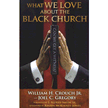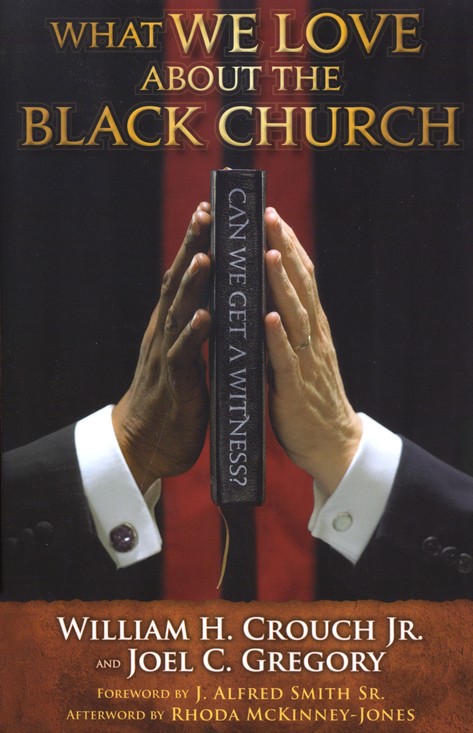As an Amazon Associate I earn from qualifying purchases.
 We are starting a new thing here. This is the SoulPreaching.Com book of the month. We will discuss the book on this page for the rest of the month and make additions as we go through the book. What is the book?
We are starting a new thing here. This is the SoulPreaching.Com book of the month. We will discuss the book on this page for the rest of the month and make additions as we go through the book. What is the book?
“What We Love About The Black Church.” Two white pastors testify to the power of the Black Church and what we can learn from it.
Many of us who are in the African American Tradition often offer helpful and valuable critiques of the church. We speak about what we need to do. We speak about what we can do better, but too often we don’t celebrate the good that it does. In this book, two outsiders to the tradition (white pastors) write about various aspects of the tradition from that of a concerned and appreciative outsider. Then prominent members of the African American Church respond to the reflection.
I love the book and think that people of all ethnicities can learn from it. Now what do we learn specifically in the book?
Dual Nature of African Americans And Preaching
In the chapter on preaching, Joel Gregory (one of the white pastors) quotes Gardner Taylor describe the Black Preacher, “Blacks are enough of a part of the total culture to understand it. Yet, they are enough apart from the total culture to see it from the side, from another angle. It is the experience of having one foot in the larger culture and one foot out of the larger culture that gives the unique angle of vision to the black preacher.” (page 2). There in a compact way we see that the vision of the Black preacher comes from this “dual-nature” that W. E. B. Dubois spoke of so long ago.
Pastor Gregory then provides and example of this in action. Here he looks at a great sermon by Doctor Taylor where he wed the transcendent and the immanent, as well as theology and ethics. Doctor Taylor demonstrated that the dual nature of African American sojourn in America gives help in addressing both the cultural and spiritual needs of humanity.
More Than Style And Mechanics
William Crouch then tells an interesting story where he thought he had found the key to great Black preaching. One of his African American friends told him about the “modulation of voice” that happens in much Black Preaching. Crouch took this and tried it in practice. In short, he failed in the presentation. I would argue it is because one of the great keys to great Black preaching is to be onesself. at any rate,Crouch comes to he conclusion that the “secret of black preaching…involves much more than I have the ability to duplicate or explain.” I would agree.
The Homiletic Bridge
Pastor Gregory then provides another reflection where he emphasized how the black preacher eliminates the distance between the past and the present providing a “homiletical bridge” between the past and the present. Yes, great preaching takes you there, this is why I emphasize in the Four Waves of Biblical Exegesis that you go walk in the text. Bring yourself in the text so that you can take your people there. Pastor Gregory has found a very important part of the tradition here.
In Pastor Crouch’s final reflection on Preaching he talks about the importance on preaching that the Black Preacher has invested in it. Great preaching is done by preachers who place preaching as a priority. Pastor Cynthia Hale provides a response to this chapter and zeroes in on making the past come alive.
Much More In The Book
And that is just one chapter. When you purchase this book you will see what these pastors have to say about Encouragement, Laughter and Light, Mentoring Ministers, Freedom of Expression, honoring elders, Power of Touch, the first Lady, Hospitality, Gratitude, Empowerment, and praise and respect. I encourage you to check it out and let me know what you think in the comments section.
 |
What We Love about the Black Church: Can We Get a Witness? By William H. Couch, Jr. & Joel C. Gregory / Judson Press Important voices offer a heartfelt celebration of the diversity of gifts within the black church that we all can learn from: a legacy of preaching; a history of social justice; gifts of encouragement, hospitality, and gratitude; a model for mentoring; a standard of honoring one’s elders; and plenty more. 150 pages, softcover. |
Amazon and the Amazon logo are trademarks of Amazon.com, Inc, or its affiliates.


Long before Rev. Dr. James Cone was elevated to and given the title of “Father of Black Liberation Theology” our ancestors identified with and understood the God of the Bible. The values which shape Black life in American, especially, the Southern Black Religious Experience, are drawn from the Bible. The God of Abraham, Issac and Jacob gave identity to we as a people when the dominant culture didn’t recognize our humanity. Therefore, when we celebrate the best of the Black Religious Experience it all starts with the living God who is involved in the life of a people who cry out to Him for help Who gives them courage to live life with dignity and hope in Him under the influence of the Holy Ghost in a strange land.
Yes…I am sure Cone would agree with you in that his project was to use the theology of the black church and translate it into academic terms…
I was intrigued to see what white pastors discover about Black preaching and was about to put this book on my list of books to consider adding to my library. But after I read that Pastor Cynthia Hale contributed a reflection the book is now at the top of my “must have” list. Thank you for the book summary and especially for mentioning Pastor Hale’s contribution.